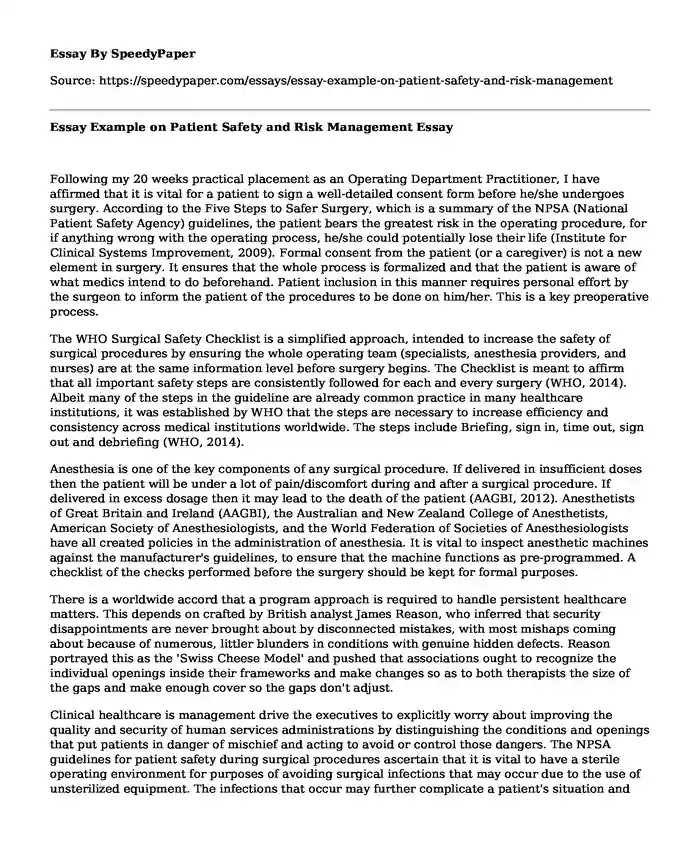
| Type of paper: | Essay |
| Categories: | Surgery Nursing management Healthcare policy Risk management |
| Pages: | 3 |
| Wordcount: | 761 words |
Following my 20 weeks practical placement as an Operating Department Practitioner, I have affirmed that it is vital for a patient to sign a well-detailed consent form before he/she undergoes surgery. According to the Five Steps to Safer Surgery, which is a summary of the NPSA (National Patient Safety Agency) guidelines, the patient bears the greatest risk in the operating procedure, for if anything wrong with the operating process, he/she could potentially lose their life (Institute for Clinical Systems Improvement, 2009). Formal consent from the patient (or a caregiver) is not a new element in surgery. It ensures that the whole process is formalized and that the patient is aware of what medics intend to do beforehand. Patient inclusion in this manner requires personal effort by the surgeon to inform the patient of the procedures to be done on him/her. This is a key preoperative process.
The WHO Surgical Safety Checklist is a simplified approach, intended to increase the safety of surgical procedures by ensuring the whole operating team (specialists, anesthesia providers, and nurses) are at the same information level before surgery begins. The Checklist is meant to affirm that all important safety steps are consistently followed for each and every surgery (WHO, 2014). Albeit many of the steps in the guideline are already common practice in many healthcare institutions, it was established by WHO that the steps are necessary to increase efficiency and consistency across medical institutions worldwide. The steps include Briefing, sign in, time out, sign out and debriefing (WHO, 2014).
Anesthesia is one of the key components of any surgical procedure. If delivered in insufficient doses then the patient will be under a lot of pain/discomfort during and after a surgical procedure. If delivered in excess dosage then it may lead to the death of the patient (AAGBI, 2012). Anesthetists of Great Britain and Ireland (AAGBI), the Australian and New Zealand College of Anesthetists, American Society of Anesthesiologists, and the World Federation of Societies of Anesthesiologists have all created policies in the administration of anesthesia. It is vital to inspect anesthetic machines against the manufacturer's guidelines, to ensure that the machine functions as pre-programmed. A checklist of the checks performed before the surgery should be kept for formal purposes.
There is a worldwide accord that a program approach is required to handle persistent healthcare matters. This depends on crafted by British analyst James Reason, who inferred that security disappointments are never brought about by disconnected mistakes, with most mishaps coming about because of numerous, littler blunders in conditions with genuine hidden defects. Reason portrayed this as the 'Swiss Cheese Model' and pushed that associations ought to recognize the individual openings inside their frameworks and make changes so as to both therapists the size of the gaps and make enough cover so the gaps don't adjust.
Clinical healthcare is management drive the executives to explicitly worry about improving the quality and security of human services administrations by distinguishing the conditions and openings that put patients in danger of mischief and acting to avoid or control those dangers. The NPSA guidelines for patient safety during surgical procedures ascertain that it is vital to have a sterile operating environment for purposes of avoiding surgical infections that may occur due to the use of unsterilized equipment. The infections that occur may further complicate a patient's situation and possibly lead to death (NPSG, 2010).
References
Accreditation Council for Graduate Medical Education. Common program requirements: VI. Resident duty hours in the learning and working environment. Chicago (IL): ACGME; 2007. Available at: http://www.acgme.org/acWebsite/dutyHours/dh_ComProgrRequirementsDutyHours0707.pdf. Retrieved on 21st June 2019.
Association of Anaesthetists of Great Britain and Ireland (2012), Checking Anaesthetic Equipment, accessed from; https://onlinelibrary.wiley.com/doi/full/10.1111/j.1365-2044.2012.07163 Retrieved on 21st June 2019.
Institute for Clinical Systems Improvement. Health care protocol: prevention of unintentionally retained foreign objects during vaginal deliveries. 3rd ed. Bloomington (MN): ICSI; 2009. Available at: http://www.icsi.org/retained_foreign_objects_during_vaginal_deliveries/retained_foreign_objects_during_vaginal_deliveries__prevention_of_untentionally__protocol_.html Retrieved on 21st June 2019.
Health and Safety Executive (UK). Human factors: fatigue. Available at: http://www.hse.gov.uk/humanfactors/topics/fatigue.htm. Retrieved on 21st June 2019.
The Joint Commission. National patient safety goals (NPSG) (2010). CAMH for hospitals: the official handbook. Oakbrook Terrace (IL) PP. 90-101.
WHO (2014), Safe Surgery Saves Lives Frequently Asked Questions, accessed from; https://www.who.int/patientsafety/safesurgery/faq_introduction/en/ on 21st June 2019.
Women's Health Care Physicians (2014), Patient Safety in the Surgical Environment, Accessed from https://www.acog.org/Clinical-Guidance-and-Publications/Committee-Opinions/Committee-on-Patient-Safety-and-Quality-Improvement/Patient-Safety-in-the-Surgical-Environment?IsMobileSet=false on 21st June 2019.
Cite this page
Essay Example on Patient Safety and Risk Management. (2023, Jan 24). Retrieved from https://speedypaper.net/essays/essay-example-on-patient-safety-and-risk-management
Request Removal
If you are the original author of this essay and no longer wish to have it published on the SpeedyPaper website, please click below to request its removal:
- Free Essay Sample on Causal Relationship
- HRM Essay Sample: Recruitment and Retention Best Practices
- Response Paper Sample on Wellness
- Essay Sample: Compassion in Undermining Political Suffering and Politically Achieved Rights
- 4P's Marketing Mix
- Ethics in the Healthcare Profession
- Essay Sample on Christian Science
Popular categories




